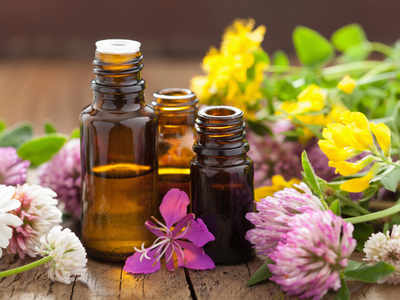- News
- lifestyle
- health-fitness
- home-remedies
- The right and wrong ways of using essential oils
Trending
This story is from August 30, 2020
The right and wrong ways of using essential oils
Before we talk about the dos and don'ts of essential oils, first we need to understand what exactly are essential oils.

Before we talk about the dos and don'ts of essential oils, first we need to understand what exactly are essential oils.
Essential oils are made from certain parts of plants like leaves, herbs, rinds and stems. Different methods are used to concentrate them into oils. Essential oils can be added to vegetable oils, creams and bath gels. To use them you can simply smell them or rub them on your skin.
Studies have shown that the use of essential oil can be helpful in many ways when you use them the right way. So, if you are eager to include essential oil in your routine, here is some help. Follow these dos and don'ts before you start.
Dos of essential oil
Essential oils like lavender, chamomile and rosewater can help keep you calm. You can smell or rub the diluted version on your skin. The oils work by sending the chemical messages to parts of the brain that affect emotion and mood. The oils won't alone take your stress away but the aroma can definitely help you relax.
2. Do check the quality before buying
Before buying essential oil, do some research and find our brands that make pure oils. Using poor quality oil can cause allergic reactions.
3. Do tell your doctor
It's important to tell your doctor if you are using any essential oils, they can help you rule out any side effects. For example, peppermint and eucalyptus oils can change how your body absorbs cancer drug 5- fluorouracil. Some of these can lead to rashes, hives and breathing problems.
4. Dilute the oil
Pure essential oils are too strong to be used straight. It's best to dilute them before using. The higher the percentage of oil, the higher are the chances of you getting a reaction. Thus it is important to dilute them correctly.
5. Do consider the age
Children and the elderly are more sensitive to essential oils. So, before using it for them you should dilute the oil more. Some oils like birch and wintergreen should completely be avoided by kids and the elderly. These oils have a chemical called methyl salicylate, which can be dangerous for kids below the age of 6. If you have to use essential oil on babies, do ask their paediatrician first.
Don'ts of using essential oils
1. Do not rub essential oil anywhere
Essential oils are fine to be rubbed on your legs and arms. But you should not put oil inside your mouth, eyes, ear or nose or private parts.
2. Do not use oils that are too old
Do not keep oils for more than three years. Older oils get spoiled because of exposure to oxygen. They might not work that well and could irritate skin and cause allergic reaction.
It's best to throw out oils from your collection that are too old. These oils might even look, feel, and smell different than what they would have been when you originally bought them.
3. Do not use essential oils on damaged skin
Injured or inflamed skin can absorb more oil and can cause not so pleasant reactions. In fact, undiluted oils can be outright dangerous for your skin.
4. Store the oil safely
Because pure essential oils can be very concrete and thus can cause some serious damage to your health. An essential oil shouldn't be too handy and little hands should not be able to reach for them. It's best to keep them locked.
5. Do not overdo it
Excess of anything is bad and so is true for essential oils. Even excess use of diluted oil can cause a bad reaction. This holds even true if you are sensitive or allergic to them.
Essential oils are made from certain parts of plants like leaves, herbs, rinds and stems. Different methods are used to concentrate them into oils. Essential oils can be added to vegetable oils, creams and bath gels. To use them you can simply smell them or rub them on your skin.
Studies have shown that the use of essential oil can be helpful in many ways when you use them the right way. So, if you are eager to include essential oil in your routine, here is some help. Follow these dos and don'ts before you start.
Dos of essential oil
1. Do try essential oils if you feel anxious
Essential oils like lavender, chamomile and rosewater can help keep you calm. You can smell or rub the diluted version on your skin. The oils work by sending the chemical messages to parts of the brain that affect emotion and mood. The oils won't alone take your stress away but the aroma can definitely help you relax.
2. Do check the quality before buying
Before buying essential oil, do some research and find our brands that make pure oils. Using poor quality oil can cause allergic reactions.
3. Do tell your doctor
It's important to tell your doctor if you are using any essential oils, they can help you rule out any side effects. For example, peppermint and eucalyptus oils can change how your body absorbs cancer drug 5- fluorouracil. Some of these can lead to rashes, hives and breathing problems.
4. Dilute the oil
Pure essential oils are too strong to be used straight. It's best to dilute them before using. The higher the percentage of oil, the higher are the chances of you getting a reaction. Thus it is important to dilute them correctly.
5. Do consider the age
Children and the elderly are more sensitive to essential oils. So, before using it for them you should dilute the oil more. Some oils like birch and wintergreen should completely be avoided by kids and the elderly. These oils have a chemical called methyl salicylate, which can be dangerous for kids below the age of 6. If you have to use essential oil on babies, do ask their paediatrician first.
Don'ts of using essential oils
1. Do not rub essential oil anywhere
Essential oils are fine to be rubbed on your legs and arms. But you should not put oil inside your mouth, eyes, ear or nose or private parts.
2. Do not use oils that are too old
Do not keep oils for more than three years. Older oils get spoiled because of exposure to oxygen. They might not work that well and could irritate skin and cause allergic reaction.
It's best to throw out oils from your collection that are too old. These oils might even look, feel, and smell different than what they would have been when you originally bought them.
3. Do not use essential oils on damaged skin
Injured or inflamed skin can absorb more oil and can cause not so pleasant reactions. In fact, undiluted oils can be outright dangerous for your skin.
4. Store the oil safely
Because pure essential oils can be very concrete and thus can cause some serious damage to your health. An essential oil shouldn't be too handy and little hands should not be able to reach for them. It's best to keep them locked.
5. Do not overdo it
Excess of anything is bad and so is true for essential oils. Even excess use of diluted oil can cause a bad reaction. This holds even true if you are sensitive or allergic to them.
End of Article
FOLLOW US ON SOCIAL MEDIA









